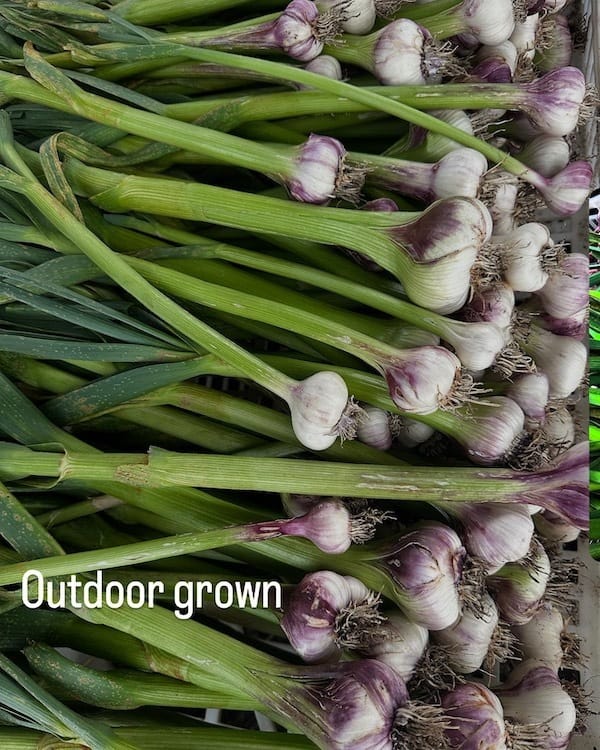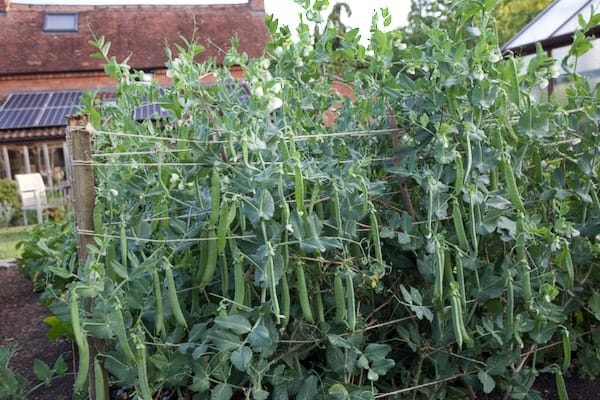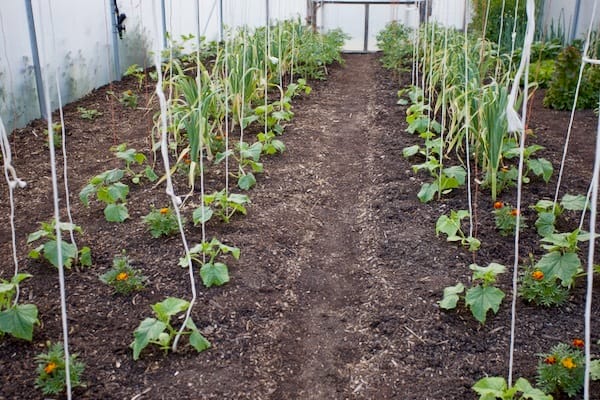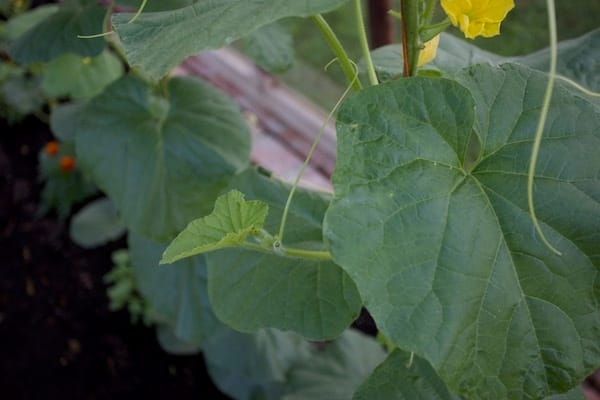Potentially an amazing month
June sees many transitions, setting the stage for continued harvests right through summer and into autumn. See my harvesting and sowing tips below.
I hope that your vegetables have grown nicely through spring, and are giving decent pickings now or soon. Here it's been warmer and sunnier than usual, always a bonus in this temperate climate. We've been watering a fair amount, which I'm happy with. It helps that the water is structured with magnets. We can apply water but cannot apply sunshine.

Squash interplant between turnips 8th May, and fleece stays over

31st May after removing the fleece, Crown Prince for winter food
There's a significant moisture deficit in the soil here, after only 42 mm / 1.7 in. rain in the three months of spring. That's one quarter of the normal amount.
I've been hearing from some of you that your spring has been cold and grey. That's more difficult than dry, when often it’s sunny. And I’m concerned that for the UK and NW Europe, June looks cool and damp.
We're in a big weather switch at the moment and I'm not feeling too optimistic about seeing sunshine or warmth in the first half of June. You can increase the warmth in soil from any sunshine, with the five stick approach I describe in New Energies. It takes 20 minutes, costs nothing and it’s helping here.
Harvests
The hungry gap is passing. June sees increasing abundance, and your picking methods can keep harvests at a high level.

May 22nd, all outdoor grown except celery from the greenhouse
Garlic Check for readiness to harvest, not by tops yellowing, but by feeling under surface level whether there is a swelling of cloves, whatever size the bulb is. We are three weeks ahead of schedule here, because of the weather. Many softneck are ready now or soon, while hardneck are usually two to three weeks later.

Leaf miner in bulbs, and rust now developing on leaves

Harvested mid-May

Yellowing garlic leaves from leaf miner, bulbs swelling, harvest now or soon
Courgettes Pick them small and regularly. This encourages the plant to keep producing rather than pouring its energy into swelling a few big fruits. Grey flecks on the leaves are not mildew, but natural colouration.

Four weeks since planted and much helped by the fleece cover
Peas Podding, snap, mangetout — all need watering, unless it’s a damp, cool start to summer. Harvest regularly, and consider leaving a few pods to ripen fully, or leave one plant unpicked, if you wish to save seed

Hurst Greenshaft 31st May, are prolific now for three weeks
Carrots Sowings of early spring are coming good now. Begin thinning (see video) if you haven’t yet — the thinnings make excellent eating, tops included (pesto is a treat).
I keep a mesh cover over carrots to reduce root fly damage, and harvest from the same bed for 7 to 8 weeks. By mid to late June, there is space to transplant autumn and winter brassicas between remaining carrots.

18th June 2024 interplanted Brussels sprout
Broad Beans Look for swelling pods at the bottom of each stem. Pick them when the beans are at whatever stage you most like, because broad beans can be eaten either small and tender, or large and meaty. For large beans, the skins of each one can be rubbed off after cooking.

Many meals from a few plants, each seed grows 3 - 4 stems
Kohlrabi Best picked while flat or round when they are more tender,

28th May, grown under mesh cover. Module-sown late February

Straeberries are fully in season now, these are Marshmello. After cropping finishes, cut plants to 2.5 cm/1" above ground level and spread compost on top. This keeps plants healthier and with fewer runners, so the fruit continue growing larger and easier to pick.
Sowing by moon phases
I find that sowing on a waxing moon results in fast germination and good harvests generally. There are other aspects of moon position, which also make a difference. Seeds sown today 1st June, grow into plants with stronger leaf growth, in proportion say to their roots. Sow lettuce, chard. kale and salad onions for example.
The scientist, Lili Kolisko, conducted 10 years of trials, comparing growth from sowing seeds at different stages of moon phase, in terms of waxing and waning. The most abundant harvests of all types of plants, including root vegetables, were from sowing two days before full moon. This June, that is Monday 9th.
Succession sowing, see new video
Here are some top picks for June. So many sowings are possible. See my Monthly Seed Collections packs.
Beetroot (multi-sown works well)
Celery
Chard
Carrots (direct)
Dwarf French Beans in module cells or direct

Lettuce will finish within a month, you can sow carrots or beans between them
Kale
Lettuce
Peas Terrain, resists mildew
Purple Sprouting Broccoli
Green and Savoy Cabbage (around the solstice)
Swedes
Early in June, you can still sow annual flowers too. Marigolds of all kinds, nasturtiums, snapdragons, scabious. Then in July, Sweet Williams / dianthus for beautiful colour next June.

Dwarf French marigolds Tagetes patula at six weeks old, were potted into 7cm pots
These sowings need shortening days
In June, avoid sowing spinach, turnip, rocket, mustards, mizuna, and fennel. The long days make them prone to bolting. Wait until mid July for fennel and early August for the others.
June jobs

Classic June flower, sweet peas and they like it temperate, moist
Edging: Grass and weeds continue to grow vigorously. A half moon edger or sharp spade will bring definition back to your surrounds.
Slug control is through tidy edges and night-time forays. Have spare plants ready to replace any casualties. See my mini-course on pest control.
Use mesh covers on young brassicas. Consider Bacillus thuringiensis as a helpful ally against caterpillars.

Mesh covers often are best on hoops, these are new cabbage plantings
Herbs: Now’s a good time to take cuttings of rosemary and thyme. Even a 20% strike rate can yield plenty of new plants.
Fruit Trees (Stone Fruits): Prune plums, greengages, cherries, apricots, and peaches now while the sap is rising — it reduces disease risk and heals the tree more quickly.
Under cover growing
Keeping up with growth is a nice problem, see my video on training cordon cucumber plants. Outdoor cucumbers do not need training.

21st May, cucumbers planted 13 days, garlic soon to harvest

Just ten days later, 31st May
Upcoming Events
I love meeting so many of you when out and about. Recent trips to Denmark, the Netherlands and Alaska have been wonderful experiences. Sharing how to garden more productively in a smaller space, with talks and workshops.
6 June – A Garden Feast and Energies talk, The Barn, Chichester 7.30-11 pm
7 June – Talk at South Downs Food & Nature Fest, all day festival
8 June – Alhampton Village Open Gardens Afternoon, 1-5 pm
9 June – Grow Urban Festival, London, debating Invisible energies with Arizona Muse and Matt Ingram at Rudolf Steiner House
21 June – 3 pm No Dig talk at Crops Not Shops Festival
2 July – Talks at RHS Hampton Court Palace Garden Festival
12th July - Talk and amazing dinner at Kate’s Four Acre Farm near Ringwood
13 July – Roots & Flame with Charles & Gaz Oakley, Homeacres

With Gaz at Homeacres May 2025
10th August - Health and Wellness Festival in Wasing, Berks, no dig talk
24th August - Organic Growers Gathering near Reading, no dig talk on last day
6 September – Homeacres Open Day, ticketed event in aid of charity
13-14 September – Workshops and garden tour at Bingenheimer Saatgut AG, Germany, about no dig, energy gardening and seed saving
20 September - Talk at Yeo Valley Garden Festival which runs from 18th
27 September – Workshop at Johnstown Estate, Co Wexford, Ireland
February 2026 Workshops and talks in Australia
Workshops at Homeacres
I taught a workshop here yesterday, and it was such a pleasure to meet gardeners from Virginia, Pennsylvania, Queensland, and all over the UK.
The next day course here is 18th June, and there's more through summer and into autumn.

Course participants love the food we provide, cooked by local chefs to transform the day’s harvests into memorable dishes, this is 31st May
Thank you for your knowledge and teachings. I am in a completely different climate, USA, Florida, your methods still work here. I started watching you 5 years ago and my soil is improving every year.
I am going to teach no dig method here in my little garden in Punta Arenas, Chilean Patagonia. Thank you for inspire people around the world!




